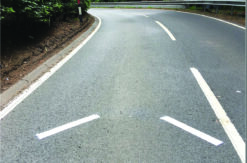
Two of the motorcycle industry’s leading players met with the Government this week to push the case for a “more sensible and holistic approach” to the path towards net zero.
Under plans announced in July 2022, the Government plans to end the sale of all new fossil-fuelled motorbikes and mopeds by 2035.
The plans are part of efforts to accelerate the transition to zero emission vehicles. They also include a 2030 cut off date for certain classes of powered two-wheelers (PTWs).
However, both the National Motorcycle Council (NMC) and Motorcycle Industry Association (MCIA) have since argued the need for a different approach.
On 7 February, both organisations delivered a briefing to MPs, peers and government representatives at the Houses of Parliament, putting forward counter proposals for decarbonisation.
Tony Campbell, CEO of the MCIA, suggested the idea of sector ‘readiness checks’ which would be done in partnership between government, industry and users before any final decisions are taken on timings for the final phase out of fossil fuelled products.
Craig Carey-Clinch, chief executive of the NMC, described how there are a wide range of views on decarbonisation and that ‘one size does not fit all’.
He called for the Government to ensure that battery electric is not the only option against an international backdrop of extensive research and development into alternatives such as clean fuels and hydrogen propulsion.
Tony Campbell said: “If manufacturers are forced to transition to zero emissions too soon, significant revenue will be lost from selling existing and near future internal combustion engined motorcycles which will have a knock-on effect when it comes to developing and manufacturing zero emission products.
“The complexities and nuances of our different vehicle categories must be fully considered as what’s feasible for some segments (e.g. mopeds) is not feasible for others (e.g. higher powered motorcycles).”
The event was attended by members of the All Party Parliamentary Group for motorcycling, plus Greg Smith MP.
The event was followed by a display of zero emission two-wheelers, which covered a range of types from lower powered commuter machines to high powered leisure types. This was also attended by Sir Lindsay Hoyle, the speaker of the House of Commons.
Anna Zee, NMC chair, said: “This was a hugely positive event which sent a clear message to policy makers that industry and riders have a clear and well-developed case for a more sensible and holistic approach to the path towards net zero when it comes to motorcycling and other L-Category vehicles – in a way that maintains choice for riders. It was interesting that much attention was paid to the possibilities of alternative fuels.
“It was plain that members of the All Party Parliamentary Group for motorcycling, plus Greg Smith MP, whose constituency includes Silverstone and who hosted the briefing, take a real interest in the subject.
“It would appear that there is a core of MPs who are not, unlike the government, focussed solely on battery electric. They recognise that one size does not fit all and would prefer to see the UK break new ground in developing alternatives.”


